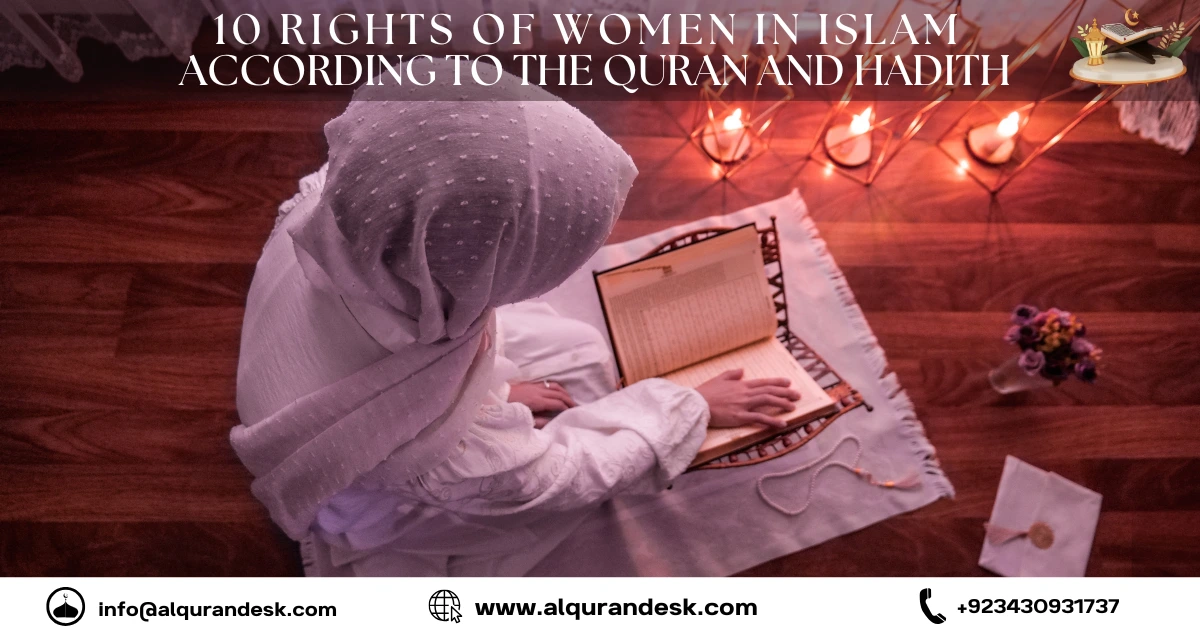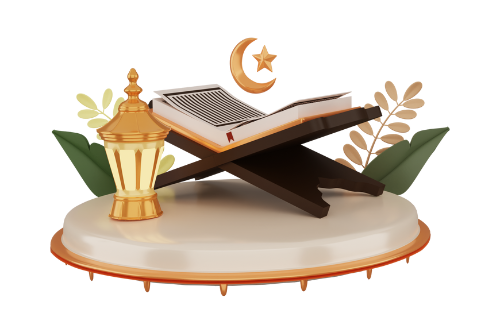
10 Powerful Rights of Women in Islam from the Quran and Hadith
Introduction
Modern society women should know their Rights in Islam according to the Quran and Hadith. Women have so many misconceptions about Islam and their rights. Some would believe that it is Islam that oppresses women, and others would believe that Muslim women lack dignity and equality. The rights of women in Islam, as taught in the Quran and Hadith, are all-rounded in protecting them in social, economic, and spiritual aspects.
When females could not get educated and inherit the grounds as well as remain free 1400 years back, Islam provided women rights of marriage, divorce, their property and respect.
The Prophet Muhammad ﷺ said:
The most exemplary of you are with your wives the best.
Rasulullah (SAW), (Tirmidhi, Hadith 3895)
There are a lot of stereotypes concerning women and Islam. It is assumed that Islam is against women; some believe that Muslim women do not have dignity or equality. Islamic rights of women, as stated in the Quran and Hadith, are holistic, safeguarding them at social, economic, and spiritual levels. Females who aim to investigate these teachings at their source can also opt to learn Quran online with Alquran desk so that they get to understand their rights as women as implied in the Quran.
Pre-Islamic History
In pre-Islamic Arabia, women were property. Girl children were killed at birth, women did not participate in the marriage decision, they did not inherit anything, and there was no divorce. Islam completely changed this:
And when the girl [who was] buried alive is questioned, what sin is it that she is killed.
This verse brought to an end the practice, and it brought back the sanctity of the lives of women.
Before the Islamic era that began in the 7th century, women in Arabia were severely oppressed and hardly had any legal, social or economic status. In most parts of the world, pre-Islamic Arabia, ancient Rome, Persia, India, etc., women have been largely considered as objects of property that, unfortunately, denied them human rights.
Pre-Islamic Arabia
No provisions about inheritance: Women were not permitted to inherit property; rather, they passed it down the line as an inheritance.
No say in marriage: Women had no right to have a say in marriage and were often given away to unions due to politics or economic weakness.
Infanticide of baby girls: Baby girls were buried alive so that there could be no shame in giving birth to girl babies.
When the liquidation is sought, and when the liquidated is asked on which of the crimes it is killed, it is said,
Work (and) strive (on) their intrigue (on) the face of the world (on) the face soaring (quran 81:8-9)
And when the girl [who was] buried alive is told the reason why she has been killing was because of what sin she has been killed.
Polygamy without limits: Men got married to numerous women without any rules or obligations to them.
Lack of economic independence: There was no right to women to own, buy or sell property.
Status of women in Islam
Islam elevated the status of women at a time when women were not regarded with dignity and considered property.
The Prophet Muhammad ﷺ said:
Best of you is Best of you, In terms of your people, And myself Best of you In terms of my people
(Tirmidhi 3895)
The best among you are the best towards their families, and the best of you towards your family is I.
This directly qualifies with respect to women as a testament of faith in the Islamic religion. The following are the 10 fundamental rights of women in Islam in the Quran and Hadith.

1. Women’s Right to Kindness and Respect
Equal respect and kindness to them is the first Islamic right of women.
And dwell with them in cordiality. But when you despise them, it may happen that you despise a thing, and Allah brings therein lots of good. (Quran 4:19)
The Prophet ﷺ used to say:
The best follower of the faith is that person whose character is best and who is best to his wife.
(Sahih Muslim 1469)
2. Women’s Right to Financial Assistance (Nafaqah)
A marriage dictates that a man provides food, shelter and clothing to his wife and children.
On the father rests the provision of the mothers and their dressing as per what is acceptable. There is no one assigned more than he can handle.” (Quran 2:233)
Women do not have to share what they have in terms of personal wealth and use up their finances on household duties.
3. Women’s right to choose a Spouse
The Islamic religion has used marriage as a contract where no one could marry anybody against his or her will.
The Prophet said:
A previously married woman is rather entitled to herself than to the guardian, and that the consent of a virgin should be sought. (Bukhari 5136)
4.Women’s right to Dowry (Mahr)
Mahr is the right only of the woman at marriage time.
And give unto the women [at marring them] their dowries reservingly And whoso fulfils that oath, fulfils it, even against himself; but whoso chooseth to remit it to thee, then thou hast released it in pleasure and ease.
This economic freedom brings women empowerment and their rights.
5.Women’s Right to Inheritance and Property
And before the arrival of Islam, women were not able to inherit. The Islamic style Islam reinstated this right
To the men a portion of what parents and near kindred leave, and to the women a portion of what parents and near kindred leave, whether it be little or much an obligatory portion. (Quran 4:7)
A woman is capable of inheriting wealth, holding and running it.
A woman can also inherit wealth, own and manage the wealth in her own right and without male guardianship. These Quranic rights indicate that Islam raised the position of women long before contemporary reforms. To know more about these cultures, you can also opt for the AlQuran desk to take a virtual class on Hadees that talks about the sayings of Prophet Muhammad ﷺ regarding the dignity and role of women in society.
6. Women’s Right to privacy, love and protection.
Husbands and wives must respect each other and have their privacy.
They are one to be fetched to the garment, and thou is to be fetched to the garment.
Revealing of secret matrimonial details was prohibited by the Prophet ﷺ:
And he that told her secrets (and went unto his wife) is the worst of creatures in the sight of Allah, on the Day of Judgment.
(Sahih Muslim 1437)
7. Women’s Right to Education and Knowledge
Islam urges men and women to learn.
It is confirmed that knowledge acquisition is obligatory for every Muslim.
Women were some of the most important scholars of Hadith and fiqh, and the wife of the Prophet, Aisha (RA), was one of the most prolific scholars of Hadith and fiqh.

8. Women’s Right to Divorce License and Khula
The right to divorce under the circumstances of mistreatment or incompatibility is given to women.
When they part ways, Allah will bestow his riches on both of them. and Allah Knows all things (and All is the Wise).
Khula is a way by which a woman may demand separation by giving back her marital deposit or get a legal arbitration.
9. Women’s Right to Equal Spiritual Rewards
And I do not waste the work of a worker among you, whether male or female.
Surely, diversity in religion is an issue (Quran 3:195)
The works of no doer among you shall I lose, either male or female.
In Islam, men and women are spiritually equal, and the attainment of piety is the real value of worthiness.
10. Women’s Right to Safety and Dignity
The Prophet ﷺ said:
And do no wrong to the female servants/masters of Allah.
And the Messenger of Allah used to prostrate himself on rock-hard (ground). (Abu Dawood 2141)
Abuse towards women, both physical and verbal, is strictly forbidden in islam.
Key Takeaways
- In Arabia and many other parts of the world, before Islam, women were denied inheritance, property, and marital rights and could be viewed as nothing more than property.
- Infanticide was prevalent among the girls in the pre-Islamic Arabic societies, and the faith strictly discouraged such practice by pronouncing daughters as an honour and reward.
- Islam had transformed the life of women by giving them the right to inheritance, ownership of property, consent to marriages and the right to divorce.
- In the Quran, clear legal safeguards were established for women in social, economic and spiritual life.
- Islam does not deprive women of their spiritual equality with men; the only thing that matters before God is how pious we are (Quran 49:13).
- Islam puts restrictions on polygamy and justice is a prerequisite to polygamy.
- Women were not vulnerable to economic advancements made by their husbands because their wages and assets belonged to them.
- The change that Islam made to the rights of women is what contributes to the debates on equality, dignity and justice that continue to take place today.
Conclusion
The rights of women in Islam are discussed in the Quran and Hadith on how Islam compelled women to rise out of oppression to dignity. Women are worshipped as daughters, sisters, mothers and wives. The Prophet Muhammad ﷺ led by example in caring and looking after women with kindness, respect and mercy, proving that the true measure of an Islamic character is how one treats women. Without any doubt, Islam was the first school to give women all legal, spiritual, and social rights, which are, nevertheless, timeless and just.
At AlQuran Desk Online Academy, we aim to present these authentic Islamic teachings to the world through proper Quran learning and understanding.
A Practical Guide for Women in Islam — Learning the Quran Online
To the Muslim women, learning is a right and a spiritual obligation. The current situation with the technologies allows people to exercise this Holy learning from the comfort of their homes. It is the most convenient way for women can learn Quran online through AlQuranDesk’s structured and interactive learning courses.
Sisters, just think of becoming closer to the Quran without the need to change your lifestyle, whether you are a high school or college student or a working mother, or a busy professional, you will be able to connect with the Quran day by day. With these customised online classes in Quran, you can learn to recite the Quran with Tajweed, learn Surah recitation by heart or understand the understanding of the Quran (Tafseer) in your own tempo under the instruction of experienced female instructors. Flexible schedules and interactive tools allow a woman to enhance her Islamic understanding and maintain balance between her family, work and personal worship, and this makes it one of the most powerful methods of fulfilling the rights and responsibilities provided to her by Islam.
Women have rights in Islam; Islam gave dignity to women after bringing them back into the high esteem of existence, as a result of oppression. Women are praised as daughters, sisters, mothers and wives. This was fulfilled on the part of the Prophet Muhammad (PBUH), who treated women kindly, respected and showed them mercy. To further research these eternal lessons and diversify your spiritual experience, top over to AlQuran where you will find it as your venue to learn Quran, Hadith, and Islamic principles online.
FAQs on Rights of Women in Islam
Q1: What are the chief privileges of the ladies in Islam?
Respect, financial care, mining bride, inheritance, privacy, education and the right of divorce.
Q2: Is it possible to retain the income of women in Islam?
Yes. The income/property of a woman belongs to her.
Q3. Is it permissible for women can work according to The Islamic faith?
Yes. Women are also able to work without losing their independence.
Q4: Is divorce obtainable by females in Islam?
Yes, either by Khula or through proceedings of the law.
Q5 Do women have an equal status to men in the Islamic religion?
Yes. Men and women are equally blessed spiritually; what counts is being righteous.
References:
- The Holy Quran – Verses from Surah An-Nisa (4:4, 4:7, 4:19, 4:130), Surah Al-Baqarah (2:187, 2:229, 2:233), Surah Ar-Rum (30:21), Surah Al-Hujurat (49:13), Surah At-Takwir (81:8-9), Surah Aal Imran (3:195), Surah An-Nahl (16:97).
- Sahih al-Bukhari – Hadith on marital consent (Hadith 5136).
- Sahih Muslim – Hadith on kindness to wives (Hadith 1469), prohibition of revealing marital secrets (Hadith 1437).
- Jami` at-Tirmidhi – “The best of you are those who are best to their wives” (Hadith 3895).
- Sunan Abu Dawood – Prohibition of harming women (Hadith 2141).
- Sunan an-Nasa’i – Guidance on providing for wives and family.
- Sunan Ibn Majah – Obligation of seeking knowledge for every Muslim (Hadith 224).
- Tafsir Ibn Kathir – Commentary on Surah An-Nisa and Surah Al-Baqarah regarding women’s rights, inheritance, and marriage.
- Al-Sirah al-Nabawiyyah (Ibn Hisham) – Biographical accounts of the Prophet Muhammad ﷺ and examples of women’s status in early Islam.
- Sunnah.com – Verified collections of Hadith for cross-reference and authentication.
- Quran.com – Multilingual Quran translations and tafsir resources.
Connect with a Quran Teacher
Start learning Holy Quran immediately by connecting with a teacher, right now!
We would love to here from you
